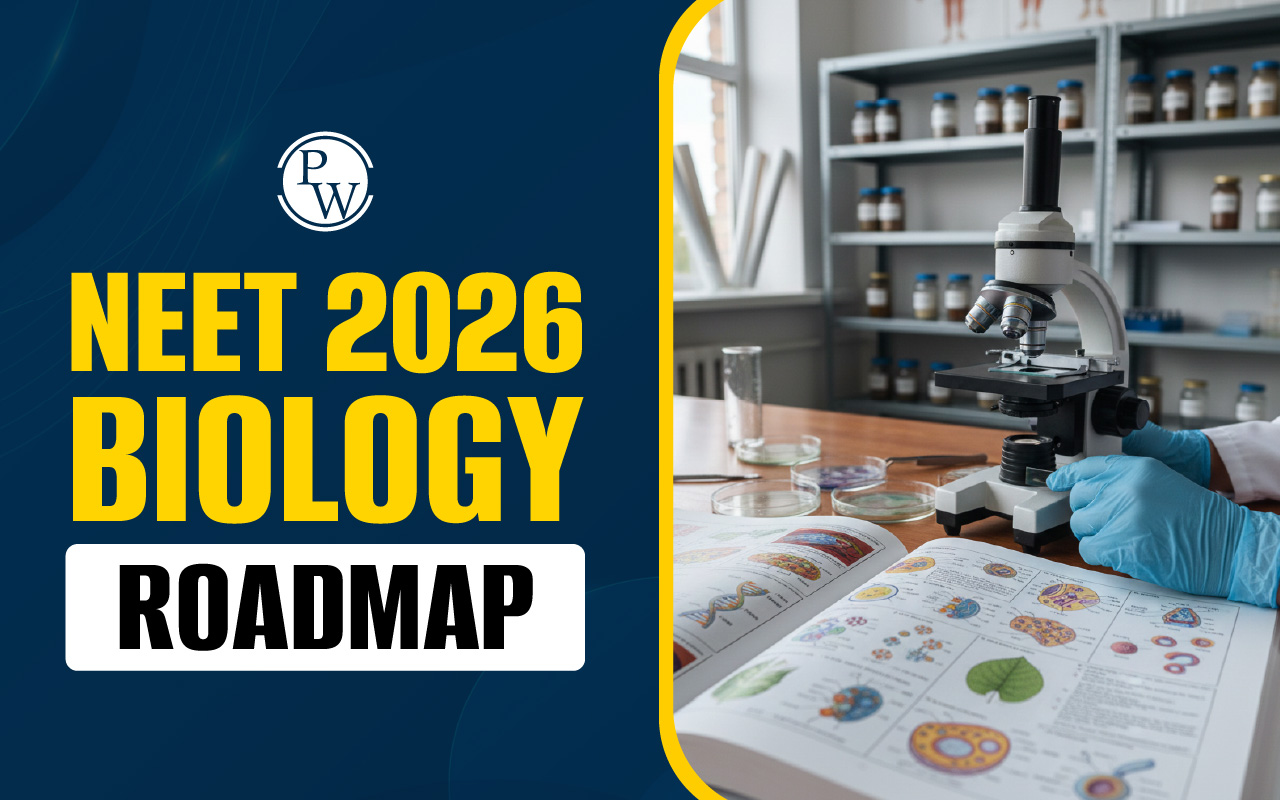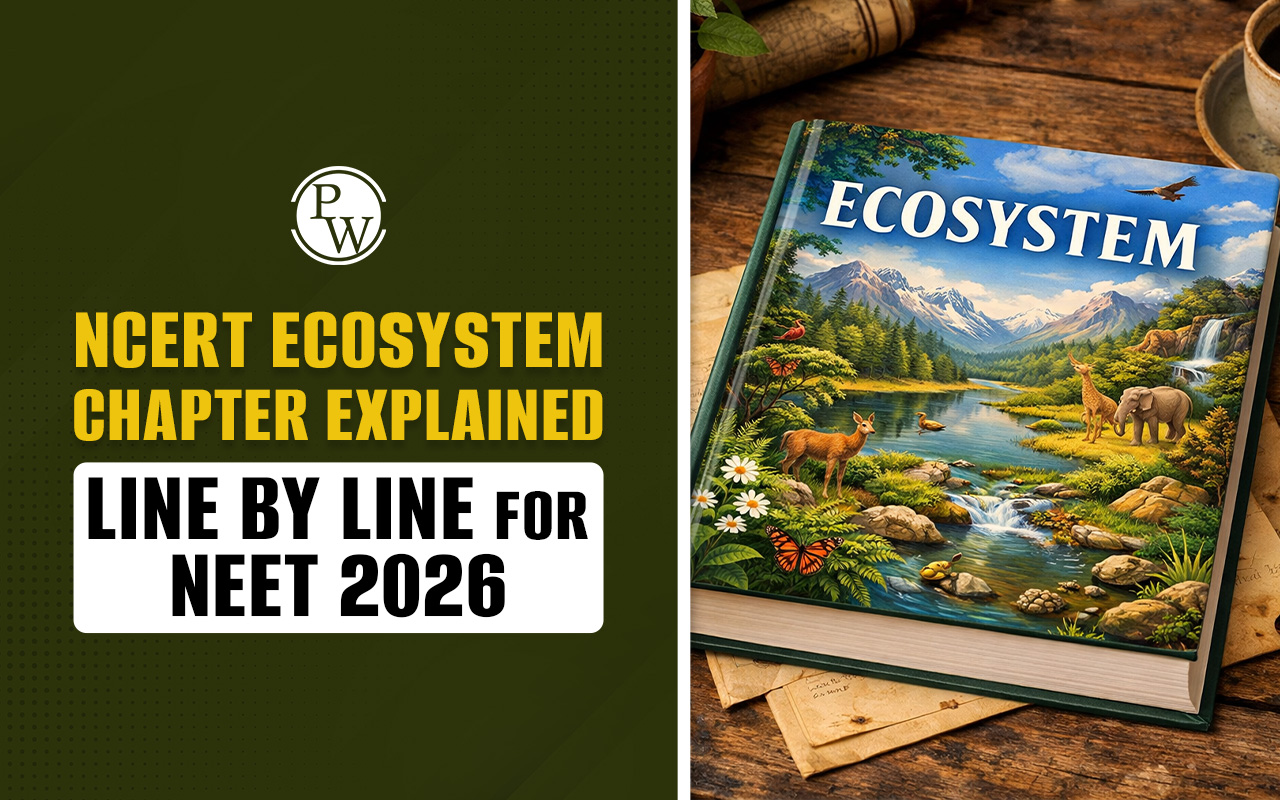
NEET Biology Syllabus 2026: The National Testing Agency (NTA) has published the Final NEET UG 2026 syllabus on its official website on 8 January 2026. Candidates are advised to prepare strictly according to the officially released syllabus until further notice or updates are issued.
The NEET Biology Syllabus 2026 carries the highest weightage in the NEET UG 2026 exam, with questions drawn from Class 11 and Class 12 NCERT textbooks. The Biology section consists of 90 questions from Botany and Zoology. Since NEET Biology is entirely NCERT-based, a strong focus on chapter-wise preparation from NCERT is essential to maximise scores.
NEET Biology Final Syllabus 2026 Out
The National Testing Agency (NTA) officially released the NEET UG 2026 Biology final syllabus on January 8, 2026, strictly aligned with NCERT Class 11 and 12 curricula for the high-scoring 360-mark section. Key units include Diversity in Living World, Human Physiology, Reproduction, Genetics and Evolution, Biology and Human Welfare, and Biotechnology, with deletions like certain Ecology subtopics for focused preparation. This syllabus emphasizes diagrams, processes, and applications, contributing 50% weightage in the exam. Download the PDF for chapter-wise details to prioritize high-yield topics like Human Physiology (20%) and Genetics (18%).
NEET Biology Syllabus 2026 Overview
National Testing Agency (NTA) has released the official NEET UG 2026 Biology syllabus on its official website. The syllabus remains unchanged from the previous year, as no modifications were introduced in NEET 2025. Candidates preparing for NEET 2026 should therefore follow the officially published Biology syllabus without referring to outdated assumptions. Here is an overview of Biology NEET Syllabus 2026 given below:
| Biology NEET Syllabus 2026 Overview | |
|---|---|
| Parameter | Details |
| Official Release | 8 January 2026 |
| Authority | National Testing Agency (NTA) |
| Syllabus Availability | NTA’s official website |
| Document Format | |
| Key Sections | Physics, Chemistry, Biology |
| Applicability | Mandatory for NEET 2026 aspirants |
NEET Biology Final Syllabus 2026 PDF
The NEET Biology Final Syllabus 2025 PDF has been officially released by the National Testing Agency (NTA) on its official website. The PDF provides a detailed, unit-wise syllabus covering Class 11 and Class 12 NCERT Biology, including both Botany and Zoology. It serves as the authoritative reference for NEET preparation, helping students plan studies effectively, focus on important topics, and ensure complete syllabus coverage as per NTA guidelines.
NEET Biology Final Syllabus 2025 PDF
NEET Biology Syllabus 2026 For Class 11
The NEET Biology syllabus for Class 11 is very important for students preparing for the NEET 2026 exam. This syllabus helps students understand what topics they need to study from their Class 11 NCERT Biology book.
|
NEET Biology Syllabus 2026 for Class 11 |
|
|---|---|
| Unit Name | Unit Topics |
| Unit 1 – Diversity of Living Organisms Change |
|
| Unit 2 – Structural Organization in Plants & Animals Change |
|
| Unit 3 – Cell Structure and Function No Change |
|
| Unit 4 – Plant Physiology |
|
| Unit 5 – Human Physiology |
|
NEET Biology Syllabus 2026 For Class 12
The NEET 2026 Biology syllabus for Class 12 builds upon the foundational knowledge gained in Class 11 and introduces more advanced concepts in Biology. This syllabus covers critical topics that are essential for aspiring medical students.
|
NEET Biology Syllabus 2026 for Class 12 |
|
|---|---|
| Unit Name | Unit Topics |
| Unit 6 – Reproduction |
|
| Unit 7 – Genetics & Evolution |
|
| Unit 8 – Biology and Human Welfare |
|
| Unit 9 – Biotechnology and its Applications |
|
| Unit 10 – Ecology and Environment |
|
NEET 2026 Biology Syllabus For Botany
The NEET botany syllabus 2026 encompasses a wide array of topics related to the study of plants. It is divided into four main sections: biochemistry, cell biology, genetics, and ecology. Below are the significant topics outlined in the biology syllabus for NEET 2026.
| NEET 2026 Biology Syllabus For Botany | |
|---|---|
| S. No | Chapter Name |
| 1 | Cell - The Unit of Life |
| 2 | Cell Cycle and Cell Division |
| 3 | The Living World |
| 4 | Biological Classification |
| 5 | Plant Kingdom |
| 6 | Morphology of Flowering Plants |
| 7 | Anatomy of Flowering Plants |
| 8 | Photosynthesis in Higher Plants |
| 9 | Respiration in Plants |
| 10 | Plant Growth and Development |
| 11 | Sexual Reproduction in Flowering Plant |
| 12 | Principle of Inheritance and Variation |
| 13 | Molecular Basis of Inheritance |
| 14 | Microbes in Human Welfare |
| 15 | Organisms and Population |
| 16 | Ecosystem |
| 17 | Biodiversity and Conservation |

NEET 2026 Biology Syllabus For Zoology
The NEET zoology syllabus 2026 is designed to assess candidates' comprehension of diverse zoological aspects, encompassing animal classification, structural organization, cell biology, and human physiology. Through these core areas, the NEET zoology syllabus 2026 offers a thorough structure for evaluating candidates' proficiency and understanding within the realm of zoology.
| NEET 2026 Biology Syllabus For Zoology | |
| S. No | Chapter Name |
| 1 | Structural Organization in Animals (including Frog) |
| 2 | Biomolecules |
| 3 | Breathing and Exchange of Gases |
| 4 | Body Fluids and Circulation |
| 5 | Excretory Products & their Elimination |
| 6 | Locomotion & Movement |
| 7 | Neural Control & Coordination |
| 8 | Chemical Coordination & Integration |
| 9 | Animal Kingdom |
| 10 | Human Reproduction |
| 11 | Reproductive Health |
| 12 | Evolution |
| 13 | Human Health and Diseases |
| 14 | Biotechnology: Principles & Processes |
NEET Biology Syllabus 2026 Weightage
Before starting the preparation, candidates should familiarize themselves with the NEET Biology chapter-wise weightage distribution of marks for NEET Syllabus 2026. Understanding the weightage helps in prioritizing topics that carry more marks. The table summarizing the marks assigned to each chapter in NEET 2026 Biology Syllabus, which is essential for effective study planning.
|
NEET Biology Syllabus 2026 Weightage |
||
|---|---|---|
| Chapters/Topics | Average No. of Questions Based on 5 Years Analysis | Weightage (%) |
| NEET Chapter Wise Weightage 2026 for Zoology | ||
| Structural Organisation in Animals (Animal Tissues) | 4 | 8% |
| Locomotion and Movement | 3 | 6% |
| Body Fluids and Circulation | 2 | 5% |
| Evolution | 3 | 6% |
| Biomolecules | 5 | 10% |
| Human Reproduction | 3 | 6% |
| Breathing and Exchange of Gases | 2 | 4% |
| Excretory Products and their Elimination | 2 | 5% |
| Reproductive Health | 4 | 8% |
| Biotechnology – Principles and Processes | 6 | 12% |
| Human Health and Disease | 3 | 6% |
| Biotechnology and its Applications | 4 | 7% |
| Animal Kingdom | 7 | 13% |
| Neural Control and Coordination | 1 | 2% |
| Chemical Coordination and Integration | 2 | 4% |
| NEET Chapter Wise Weightage 2026 for Botany | ||
| Biodiversity and Conservation | 2 | 4% |
| Anatomy of Flowering Plants | 3 | 7% |
| Cell : The Unit of Life | 2 | 5% |
| Respiration in Plants | 2 | 4% |
| Microbes in Human Welfare | 2 | 4% |
| Cell Cycle and Cell Division | 4 | 9% |
| Molecular Basis of Inheritance | 6 | 14% |
| Principles of Inheritance and Variation | 5 | 10% |
| Sexual Reproduction in Flowering Plants | 3 | 6% |
| Ecosystem | 2 | 4% |
| Morphology of Flowering Plants | 3 | 6% |
| Plant Growth and Development | 3 | 6% |
| The Living World | 0 | 1% |
| Plant Kingdom | 3 | 7% |
| Biological Classification | 1 | 3% |
| Organisms and Populations | 2 | 4% |
| Photosynthesis in Higher Plants | 2 | 4% |
NEET Biology Syllabus 2026 Important Topics
In preparation for the biology syllabus for NEET 2026 exam, candidates are advised to focus on fundamental biology concepts. It is recommended that candidates prioritize their study on specific key biology subjects of NEET botany syllabus 2026 and NEET Zoology syllabus 2026 for NEET UG 2026, determined based on the frequency of questions and their weightage in previous years' exams.
NEET Botany Syllabus 2026 Important Topics
If you're preparing for NEET 2026 and studying the Botany syllabus, it's important to focus on key topics that often appear in the exam. By understanding these topics well, you can improve your chances of performing better in the biology section of the NEET 2026 exam.
| NEET Botany Syllabus 2026 Important Topics | |
|---|---|
| Chapter Name | Topics |
| Cell - The Unit of Life |
|
| Cell Cycle and Cell Division |
|
| The Living World |
|
| Biological Classification |
|
| Plant Kingdom |
|
| Morphology of Flowering Plants |
|
| Anatomy of Flowering Plants |
|
| Photosynthesis in Higher Plants |
|
| Respiration in Plants |
|
| Plant Growth and Development |
|
| Sexual Reproduction in Flowering Plant |
|
| Principle of Inheritance and Variation |
|
| Molecular Basis of Inheritance |
|
| Microbes in Human Welfare |
|
| Organisms and Population |
|
| Ecosystem |
|
| Biodiversity and Conservation |
|
NEET Zoology Syllabus 2026 Important Topics
This part talks about the important stuff you need to know in the NEET Zoology syllabus 2026. These topics are super important because they come up a lot in the biology syllabus for the NEET 2026 exam. If you really understand and get good at these topics, it will make your biology foundation really strong and boost your chances of doing well in the NEET exam. Here are the key topics you should focus on for NEET prep:
| NEET Zoology Syllabus 2026 Important Topics | |
|---|---|
| Chapter Name | Topics |
| Structural Organization in Animals (including Frog) |
|
| Biomolecules |
|
| Breathing and Exchange of Gases |
|
| Body Fluids and Circulation |
|
| Excretory Products & their Elimination |
|
| Locomotion & Movement |
|
| Neural Control & Coordination |
|
| Chemical Coordination & Integration |
|
| Animal Kingdom |
|
| Human Reproduction |
|
| Reproductive Health |
|
| Evolution |
|
| Human Health and Diseases |
|
| Biotechnology: Principles & Processes |
|
Books For NEET 2026 Biology Syllabus
For comprehensive coverage of the NEET 2026 Biology Syllabus, students can refer to a variety of books that provide in-depth explanations. Highly recommended options include NCERT textbooks and other authoritative sources. These books aid in building a strong conceptual understanding necessary for the NEET 2026 Biology Syllabus.
| NEET syllabus 2026 for Biology – Books | |
|---|---|
| Book Name | Book Link |
| Arjuna Class 11 PCB Combo | Access Link |
| NTA NEET Rankers Test Series 2025 | Access Link |
| Lakshya Class 12 PCB Combo | Access Link |
| Yakeen NEET Dropper PCB Combo | Access Link |
NEET 2026 Biology Syllabus Preparation Tips
Preparing for the NEET 2026 Biology syllabus requires strategic planning and diligent study. Here are some tips to help you effectively prepare:
- Stick to NCERT Books: The NEET Biology syllabus is strictly based on Class 11 and 12 NCERT textbooks. Read each chapter line-by-line and understand the diagrams and in-text information.
- Focus on High-Weightage Chapters: Give extra time to important chapters like Human Physiology, Genetics, Plant Physiology, Reproduction, and Ecology. These topics often have more questions in the exam.
- Make Short Notes: Write down key terms, definitions, and important points while studying. These short notes will help you revise faster before the exam.
- Practice MCQs Daily: After studying a topic, solve multiple-choice questions from that chapter. This improves accuracy and boosts confidence.
- Revise Regularly: Keep revising both Class 11 and Class 12 Biology topics regularly to retain the information longer. Weekly and monthly revisions help reduce exam stress.
NEET Biology Syllabus 2026 FAQs
What is the NEET 2026 Biology syllabus based on?
Has the NEET 2026 Biology syllabus been officially released?
How many questions are asked from Biology in NEET 2026?
Is NCERT enough for NEET 2026 Biology preparation?










